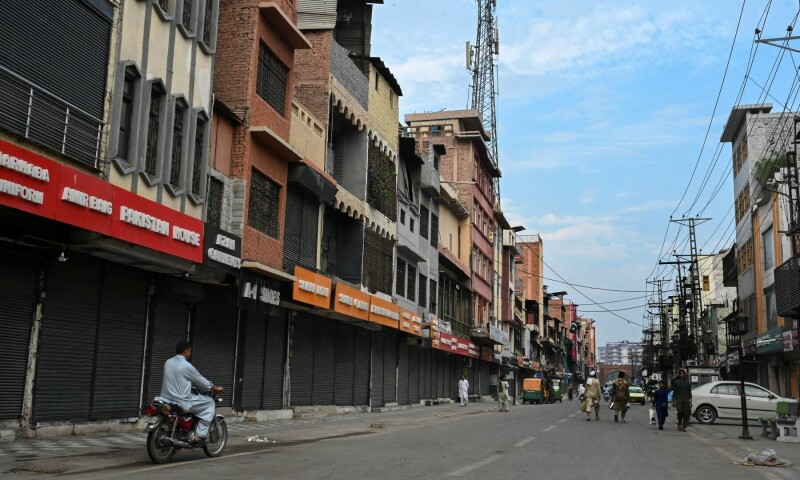Traders across major cities of Pakistan observed a shutter-down strike on Wednesday against the government’s much-touted tax reforms, including the Tajir Dost Scheme.
In March, the Federal Board of Revenue (FBR) introduced the ‘Tajir Dost Scheme’ to bring traders and wholesalers into the formal tax structure as required by the International Monetary Fund (IMF). The move had led to concerns and reservations among the traders.
Earlier this month, the traders’ community, including Markazi Tanzeem-i-Tajran Pakistan and All Pakistan Anjuman-i-Tajran, announced a nationwide strike against the Tajir Dost Scheme as well as heavy taxation and inflated electricity bills.
Trader’s bodies have decried the tax challans — to the tune of Rs60,000 — issued to small businesses and retailers, saying those registered under the scheme were promised they would not have to pay more than Rs1,200 in taxes.
The expansion of the country’s tax base will now pose a significant challenge for the PML-N and its coalition partner, the PPP, as the protesting traders have political affiliations with these parties. Nevertheless, opposition parties — Jamiat Ulema-i-Islam-Fazl, Jamaat-i-Islami, and the Awami National Party — have declared their support for the agitating traders.
Shutters in the metropolitan cities of Karachi and Lahore remained closed as the call for strike from traders’s associations received an overwhelming response from the community.
Punjab
In Lahore, shops on Hall Road, where the JI has set up a camp to mobilise traders and the general public, as well as on Mall Road, remained closed as traders observed the strike.
According to a Dawn.com correspondent based in Lahore, the strike extended to Multan, Faisalabad, Islamabad, Rawalpindi, and other cities of Punjab as well.
Merchants on the Chakwal-Talagang road and in the main market of Kharian city kept their shops closed.
Meanwhile, traders in Islamabad’s I-10 sector also reportedly heeded the call for the strike.
Khyber Pakhtunkhwa
In KP, traders and transporters across the Malakand and Hazara divisions observed a shutter-down and wheel-jam strike against the heavy taxes.
Rallies in various cities of the province were also carried out with the support of the JI.
Abdur Rahim, the divisional president of a Malakand trade union, highlighted that the division was merged with Pakistan in 1969 under an agreement that exempted it from all kinds of taxes. However, the recent imposition of taxes was beyond his understanding, he said.
Rahim further said that the residents of Malakand were paying huge taxes indirectly through inflated utility bills and mobile prepaid services.
He added that the entire country was using their resources — particularly “electricity generated from the KP rivers” — but despite their agitations, meetings, and promises, the people there already “hit by militancy and disaster had never been facilitated or benefited”.
“The entire business community is united in this cause,” said Muhammad Zada, the president of a trade union in Shangla district’s Bisham tehsil.
He emphasised that the “only demand was that the government decrease the electricity rates and reverse the decision of tax net expansion to Malakand division”.
Zada said traders in Bisham would also stage a protest rally in the afternoon on the Karakoram Highway to pressure the government to make “positive decisions in support of the business community and instead impose taxes on landlords, as well as end the agreements with independent power producers”.
He claimed the government was favouring a particular class, alleging that it facilitated only those in Punjab as its “leadership tilt” there.
Deshani warned of traders commencing a movement against the government for its “failed policies and day-to-day inflation” if it did not accept their demands.
The union president emphasised that record inflation in the country had destroyed the economy, industries, and small businesses, impacting labourers.
Noting that many traders had lost their businesses due to inflationary pressure, Deshani said they had “lost strength” when it came to carrying on with their businesses.
He asked that the government “take emergency corrective measures” to improve the economy, considering that the “continued free fall of the rupee against the dollar snatched purchasing power from traders”.
Shah Hussain, another trade leader from Battagram, said the bills had made the traders “hapless”.
Traders had “no idea what to do and where to go” with local resources being depleted and revenue generation coming to a halt because of inflation, he said.
Hussain censured the government for running on IMF directives, stating that political leaders had “no idea and plan to take the country [out of] the crisis”.
Echoing Rahim’s statements, he pointed out that KP generated “7,500 megawatts” of electricity with the centre “buying it Rs2 per unit and selling it back to the people at Rs57”.
‘FBR willing to resolve issues, won’t withdraw scheme’
Iftikhar Ahmed Sheikh, president of the Karachi Chamber of Commerce and Industry (KCCI), had urged all its members to fully support Wednesday’s countrywide strike by closing their businesses.
Muhammad Kamran Arbi, president of the Site Association of Industry, has extended firm support to the traders’ strike. The Korangi Association of Trade and Industry and the Central Association of Tajran Pakistan have also announced their support.
Traders’ representatives visited the FBR’s headquarters on Tuesday to express their discontent to the revenue board’s chief Rashid Mahmood and his team regarding the Tajir Dost Scheme, which was implemented in April, and the recently notified tax rates that took effect in August.
FBR chief Mahmood told Dawn that the FBR is willing to resolve “legitimate issues” raised during the meeting. “We are ready to make amendments to the SRO to address their concerns,” he said.
However, he emphasised that the FBR will not withdraw the Tajir Dost Scheme, which aims to bring the retail sector under the tax net.
The FBR chief hinted at setting up a market-level review mechanism with representation from tax officers and traders to ensure that no shopkeepers face unfair tax rates. “We can rectify such issues by making amendments to the SRO.”
Under the scheme, tax rates will be collected from shopkeepers in 42 cities across the country at a fixed rate of Rs100 to Rs20,000 per month, based on the fair market value of their stores.







